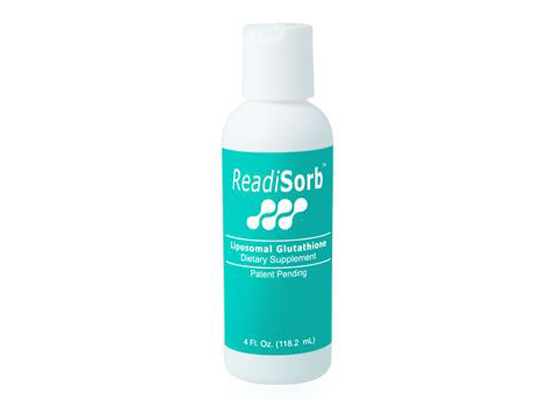
A few weeks ago, we introduced you to ReadiSorb, the most researched and validated Glutathione (GSH) product available today for practitioners. The key to ReadiSorb’s success is the fact that GSH must be absorbed and transported before it is digested in the stomach. ReadiSorb’s liposomal GSH has been shown to be absorbed in the mouth, esophagus and upper stomach—going directly into the blood and lymphatic systems rapidly.
There are over 100,000 studies involving Glutathione and attesting to its importance in human cellular function. It is used in metabolic and biochemical reactions, such as DNA synthesis and repair, protein synthesis, prostaglandin synthesis, amino acid transport, metabolism of toxins and carcinogens, immune system function, preventions of oxidative cell damage, and enzyme activation. Thus, every system in the body can be affected by the state of the GSH system, especially the immune, nervous, and gastrointestinal system, as well as the lungs.
Most GSH clearance from plasma occurs in the kidneys and the lungs. In the kidneys, exposure to toxins and the requirement for detoxification by GSH are high. Steady-state intracellular GSH concentrations vary in different parts of the kidneys, which also may determine the localization of injury by toxins.
Depletion of intracellular GSH appears to be critical for subsequent alterations in protein thiol and calcium homeostasis. GSH depletion and the subsequent low stores of protein thiol result in both calcium release from intracellular stores and inhibition of calcium extrusion, producing a marked increase in cytosolic calcium concentration, which triggers cytotoxicity.
GSH and its metabolites also interface with energetics and neurotransmitter syntheses through several prominent metabolic pathways. GSH availability down-regulates the pro-inflammatory potential of leukotrienes and other eicosanoids. Recently discovered S-nitroso metabolites, generated in vivo from GSH and NO (nitric oxide), further diversify GSH’s impact on metabolism.
GSH may be especially important for organs that are exposed to exogenous toxins, such as the liver, kidneys, lungs, and intestines. Reduced GSH occurs in millimolar concentrations intracellularly in humans, but in only trace amounts in plasma and most other body fluids. One exception is fluids lining the lower part of the respiratory tract, where it may help to scavenge inhaled toxins and free radicals produced by activated lung phagocytes.
Conditions that have been observed to include low levels of Glutathione include Parkinson’s, Autism, HIV, mycotoxin infections and all chronic disease states. I will go so far as to say that anyone living in a world with air, water and food contaminants has a high chance of being Glutathione deficient. Add some alcohol, acetaminophen, x-rays and ultraviolet rays, and the problem becomes worse.
We have been asked about liposomal products in capsules or pearls. These products have never been proven to work very effectively because they must traverse the digestive tract and be reassembled in the liver and cells of the body. Taking precursors for GSH such as Cysteine, NAC and SAMe have been used with limited success because of the complexity of rate-limiting mechanisms.
The beauty of ReadiSorb is the fact that it is a major piece of health restoration and is important for anti-aging, given that GSH helps to recycle other antioxidants such as Vitamin C and Vitamin E.
With such an important piece of the health puzzle needing to be addressed, it is great to know that ReadiSorb is a proven product based on over 10 research and clinical studies that have been performed to date with more studies ready to be published.
Anova Health is very interested in compiling results from our practitioners on the use of ReadiSorb, and welcome your use of and feedback on clinical cases from ReadiSorb use.




Speak Your Mind